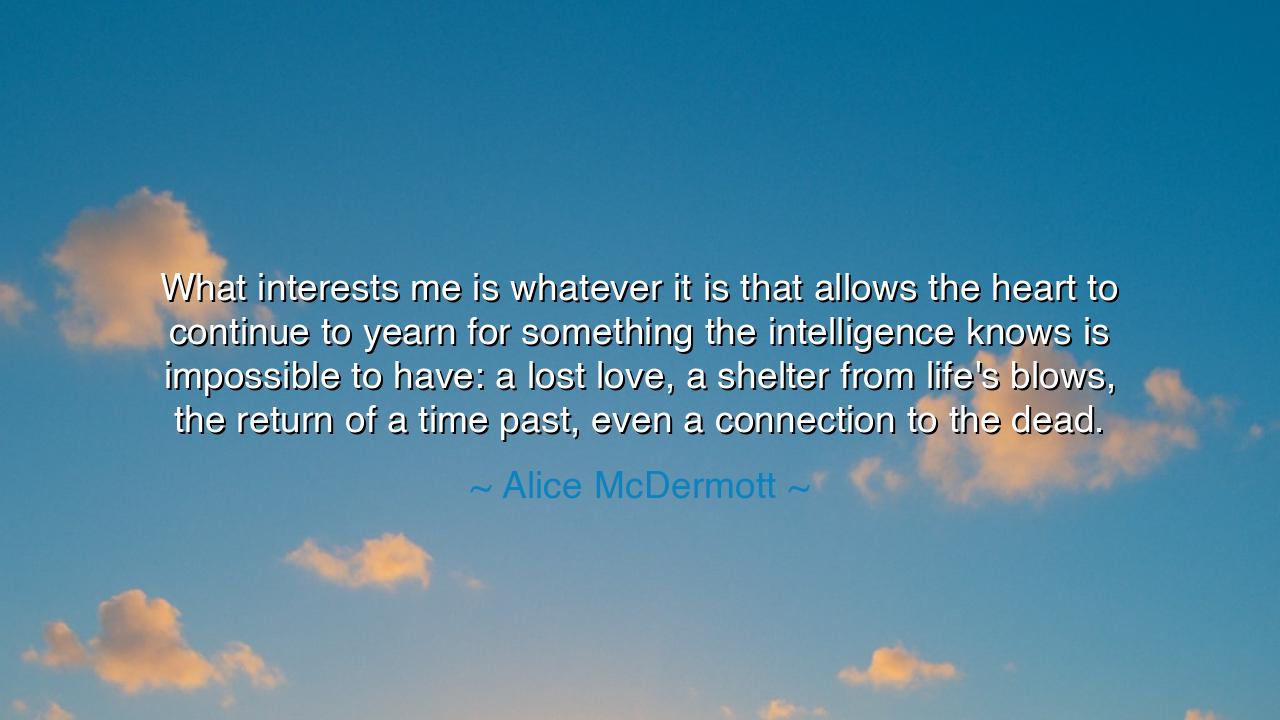
What interests me is whatever it is that allows the heart to
What interests me is whatever it is that allows the heart to continue to yearn for something the intelligence knows is impossible to have: a lost love, a shelter from life's blows, the return of a time past, even a connection to the dead.






The Sacred Yearning of the Human Heart
Among the most profound reflections upon the soul’s nature are those spoken by the novelist Alice McDermott, who said: “What interests me is whatever it is that allows the heart to continue to yearn for something the intelligence knows is impossible to have: a lost love, a shelter from life’s blows, the return of a time past, even a connection to the dead.” In this sentence, she captures the essence of the human condition—the eternal tension between the mind that knows and the heart that hopes, between reality’s boundaries and the soul’s infinite desire to transcend them.
The origin of these words lies not merely in the intellect of a writer, but in the deep well of human experience. Alice McDermott, a storyteller of quiet truths and ordinary miracles, often explores the lives of people who love deeply, lose deeply, and yet somehow continue to reach for meaning amidst impermanence. Her words arise from the observation that no matter how rational or wise a person becomes, there remains within them a mysterious ache—an unquenchable yearning for what cannot be regained. This longing is not foolishness; it is proof of the heart’s divinity. It is the echo of eternity within mortal flesh.
For what is the heart, if not the part of us that refuses to yield entirely to reason? The mind can measure the distance between what is and what cannot be; it can name the impossible. Yet the heart—brave, tender, and stubborn—still dreams of it. It remembers lost love and longs for its warmth. It aches for a time when things were simpler, for youth, for laughter that has faded into memory. It seeks, even in its grief, a connection to the dead, as if love could reach beyond the grave. The heart does not obey logic, for it is bound not to the laws of time or space, but to the eternal rhythm of being.
The ancients, too, knew this sacred contradiction. Orpheus, the musician of legend, descended into the underworld to reclaim his beloved Eurydice. Though reason would have warned him that death is final, his love dared to defy it. His song charmed even the stones and moved the hearts of the gods—but when he turned too soon, his beloved was lost forever. Yet even in failure, Orpheus became a symbol of the heart’s yearning—its divine madness that seeks what cannot be attained. His tragedy, like McDermott’s reflection, teaches us that the yearning itself, not its fulfillment, gives life its meaning.
There is a strange beauty in this endless reaching. Though our minds may call it futile, the heart’s yearning ennobles us—it keeps the flame of humanity alive. For if we ever ceased to long for what is beyond our reach, we would also cease to love deeply, to remember passionately, to dream boldly. The yearning for what is lost—the past, the beloved, the unreachable ideal—reminds us that our lives are not merely a sum of facts and moments, but a song written in both joy and sorrow. The heart keeps singing even when it knows the echo will never return.
In this, there is a lesson for all who live and love: Do not despise your longing, even when it pains you. The ache for what cannot be is not a flaw, but a form of grace. To yearn for the past is to honor its beauty; to dream of impossible love is to affirm that the heart was made for eternity. Though we cannot bring back the dead or relive lost time, we can carry their light forward in our acts of kindness, creativity, and remembrance. Yearning, when embraced with wisdom, becomes not despair but devotion—a testament that the soul remembers it was made for more than this fleeting world.
And so, my children of thought, take Alice McDermott’s words as both comfort and command. Let your mind know the limits of the possible, but let your heart reach beyond them. Love even when it hurts. Remember even when the past cannot return. Seek meaning even where reason finds none. For it is the yearning itself—this holy, irrational, luminous ache—that proves we are alive, that we have loved, and that something eternal moves within us still. The mind may measure life by what is lost, but the heart redeems it by continuing to dream.






AAdministratorAdministrator
Welcome, honored guests. Please leave a comment, we will respond soon